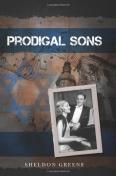BKMT READING GUIDES
Prodigal Sons (Volume 0)
by Sheldon Greene
Paperback : 342 pages
0 club reading this now
0 members have read this book
Introduction
Munich, 1950, occupied West Germany; Horst Vogle is quietly working to reassemble the city museum's art collection. Aspiring pianist, Greta Furster, introduces him to a group of ambitious war veterans seeking to restore German pride and help refugees fleeing the Communist East. Vogle learns that they are using Nazi gold to fund Egyptian weapons intended to be used against Israel. Vogle has his own secret. He is Jan Goldberg, one-time Jewish Partisan and soldier in the Israeli War of Independence, now an Israeli assassin, targeting Nazi fugitives. To Goldberg, recovering gold taken from Jewish victims is a way of gaining retribution for the Holocaust and as his bond to Greta intensifies, his mission and identity are tested. This fact-based thriller is a must-read for fans of John Le Carré and Alan Furst. It's an intriguing take on the Nazi legacy in Post War Germany and an exploration of the polarities of revenge and reconciliation, the limitations of ideology, and the power of love.
Excerpt
The eighth game of a grueling set--set point in fact--and Hermann was serving. He observed Horst shifting from one foot to the other, head thrust forward, hair plastered to his forehead with sweat. Hermann summoned his confidence, and bounced the ball on the court a few times. Just an ace. He rolled back, his arm swung out like a pendulum, the racket head dropped behind his back as the ball slowly ascended, paused, then began to drop as he struck it obliquely on the sweet spot of his racket. The ball sliced toward the outside line and skidded just inside the box and he rushed the net. Horst lunged, caught the ball on the edge of the strings, and it came off the racket high and without much momentum. Hermann extended laterally and blocked the ball. Horst rushed toward it and spooned it up off a low bounce. It touched the tape, paused, then dropped back into his own service box. ...Discussion Questions
From the author:1. Jan/Horst’s feelings have been burned by his life experience; the death of his family, the destruction of his future, the struggle for survival in Palestine. Can his willingness
to assassinate Nazis be justified by his life experience? Is killing another person ever justified?
2. Can you think of instances in the book in which stereotypes distort reality? How about instances in your own life?
3. What do the characters have in common? Horst, Hermann, Uri for example.
4. What motivates Freddie to suspect Horst?
5. The novel leads the reader to speculate on whether Jan/Horst leaves Germany. What do you think he does? What would you do under the circumstances?
6. What if anything changes Jan/Horst’s sense of purpose?
7. Do you believe that love can change us for the better? In what ways?
8. If you are familiar with Wagner’s opera, Gotterdammerung, Twilight of the Gods, can you identify any elements of the novel in which the author is alluding to that story?
9. What’s the significance of Bach’s Goldberg Variations?
Notes From the Author to the Bookclub
Note from author Sheldon Greene: My goal is to entertain, inform and transcend the reader’s reality. The central theme of the novel is the redemptive value of love for another person and its capacity to overwhelm the blinding force of ideology. The change agent in the book is love. If that sounds like a cliché, so be it. But for me, love, of other people, of the world, is the seminal component of the life force. It’s social gravity. I want the reader to conclude that ideological convictions of any stripe prevent people from processing reality clearly. Rather, they see the world through the warped lenses of their preconceptions. I was inspired to write it after reading about a few intellectual survivors of the Warsaw Ghetto and the Israeli War of Independence who returned to Germany to kill Nazi’s who had escaped the de-Nazification process. My research led me to a post war Neo-Nazi organization that was continuing the war against the Jews.Book Club Recommendations
Recommended to book clubs by 0 of 0 members.
Book Club HQ to over 90,000+ book clubs and ready to welcome yours.
Get free weekly updates on top club picks, book giveaways, author events and more








